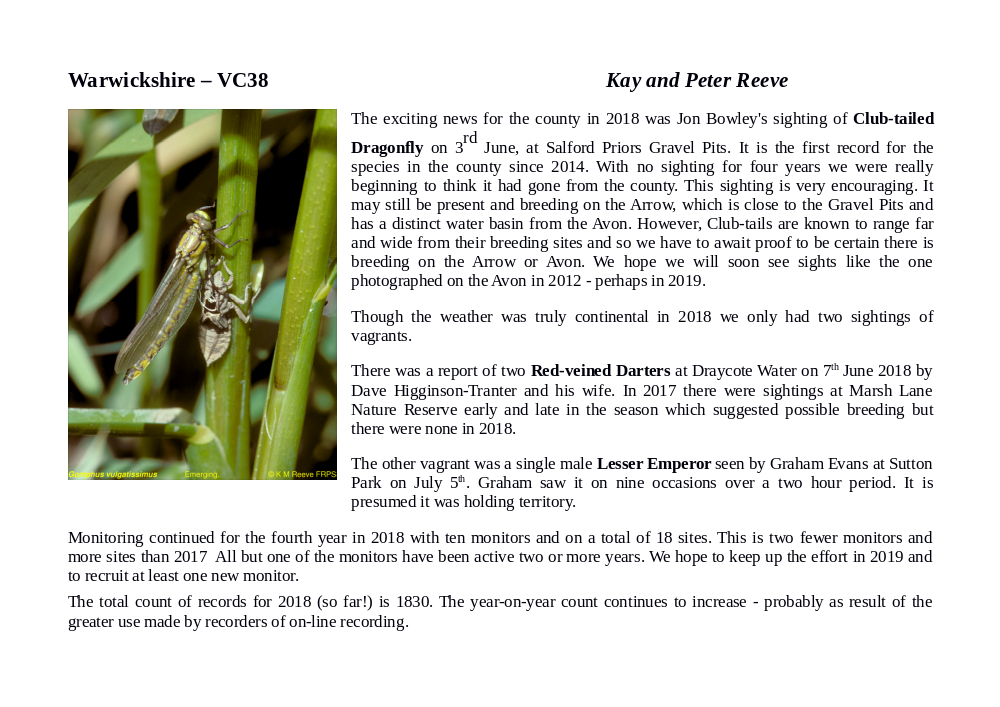Warwickshire Dragonfly Group - News page
Last Flights Table
First Flights Table
Display records page.
October 1st 2019 - Short report on our new breeding species - Willow Emerald.
July 17th 2019 - Reports on the Parsonage Moor and Packington Park Field Meetings.
June 30th 2019 - Parsonage Moor and Dry Sandford Pit Field Meeting..
June 8th 2019 - Packington Park Field meeting.
July 14th 2019 - Keeled Skimmer at Bubbenhall Meadow and Red-veined Darters seen at Earlswood Lakes and all early and mid summer species flying.
Keeled Skimmer at Bubbenhall Meadow 13 July.
Red-veined Darters at Earlswood Lakes 4 July.
All early and mid-summer species now flying.
Some interesting observations by Darran Rickards..
Synchronised emergence of Four-spotted Chasers revisited.
A beautiful hypothese destroyed by evidence.
May 29th 2019 - Thirteen species now flying.
Hairy Dragonflies at Alvecote Wood.
Ten further species flying since 20th May.
Synchronised emergence of Four-spotted Chasers.
See P.S.
May 10th 2019 - More early fliers.
First flying Large Red Damselflies
Broad Bodied Chaser at Newton Cutting.
May 10th 2019 - More early fliers.
First flying Large Red Damselflies
Broad Bodied Chaser at Newton Cutting.
April 9th 2019 - First adult of 2019. A Banded Demoiselle at Ladywalk N.R. 30th March.
April 2019 - Report for
2018 published in the BDS Darter journal.
Table of
Latest Dates Recorded in Warwickshire
Species
|
Date 2019
|
Latest before 2019
|
Site for 2019
|
Recorder 2019
|
| Azure Damselfly. | 5.8.2019
|
15.9.1969
|
Outspan, Leamington Hastings
|
Kay & Peter Reeve |
| Banded Demoiselle. | 21.9.2019
|
3.11.1995
|
Avon, Barton
|
Mick Schilling |
| Beautiful Demoiselle. | 12.8.2019
|
3.9.2012
|
Brandon Marsh
|
David Freeman |
| Black-tailed Skimmer. | 19.10.2019
|
23.9.2016
|
Sun Rising Natural Burial Ground., - S11
|
David Orr |
| Blue-tailed Damselfly. | 28.9.2019
|
12.10.1990
|
Avon, Barton
|
Mick Schilling |
| Broad-bodied Chaser. | 22.7.2019
|
31.8.1992
|
Sutton Park
|
Richard Orton,Sutton Pk.Grp. |
| Brown Hawker. | 29.9.2019
|
27.10.2014
|
Arrow, Wixford
|
Mick Schilling |
| Common Blue Damselfly. | 23.9.2019
|
17.11.2011
|
Bubbenhall Meadow
|
Jim Timms |
| Common Darter. | 29.10.2019
|
6.12.2009
|
Brandon Marsh
|
Jim Timms |
| Emerald Damselfly. | 20.9.2019
|
2.10.2015
|
Bubbenhall Meadow
|
Jim Timms |
| Emperor Dragonfly. | 27.8.2019
|
12.10.2012
|
Marsh Lane Nature Reserve, Hampton in Arden
|
Kay & Peter Reeve |
| Four-spotted Chaser. | 29.7.2019
|
1.9.2009
|
Sutton Park
|
Richard Orton,Sutton Pk.Grp. |
| Four-spotted Chaser. | 29.7.2019
|
1.9.2009
|
Frakton Ponds
|
Kay & Peter Reeve |
| Hairy Dragonfly. | 3.6.2019
|
5.7.2016
|
Dost Hill, RSPB Middleton Lakes
|
Member RSPB team |
| Keeled Skimmer. | 13.7.2019
|
3.8.2009
|
Bubbenhall Meadow
|
Ian Harris |
| Large Red Damselfly. | 16.7.2019
|
31.8.1983
|
Outspan, Leamington Hastings
|
Kay & Peter Reeve |
| Migrant Hawker. | 29.10.2019
|
20.11.2014
|
Brandon Marsh
|
Jim Timms |
| Red-eyed Damselfly. | 17.9.2019
|
15.9.2012
|
Brandon Marsh
|
Jim Timms |
| Red-veined Darter. | 5.7.2019
|
20.8.2001
|
Earlswood Lakes
|
Mick Schilling |
| Ruddy Darter. | 28.9.2019
|
25.10.2011
|
Confidential location
|
Kay & Peter Reeve |
| Scarce Chaser. | 15.7.2019
|
27.7.2016
|
Avon, Barton
|
Mick Schilling |
| Small Red-eyed Damselfly. | 17.9.2019
|
30.9.2015
|
Brandon Marsh
|
Jim Timms |
| Southern Hawker. | 28.9.2019
|
12.11.2015
|
Avon, Barton
|
Mick Schilling |
| Southern Hawker. | 28.9.2019
|
12.11.2015
|
Brueton Park, Solihull, Malvern & Brueton Park LNR
|
Nick Wood |
| White-legged Damselfly. | 13.9.2019
|
19.9.2015
|
Charlecote Park
|
Mick Schilling |
| Willow Emerald Damselfly. | 28.9.2019
|
First County Record |
Confidential location
|
Kay & Peter Reeve |
If you have any later dates for 2019 or
later times for previous years please let me have them.
Table of
Earliest Dates Recorded in Warwickshire
Species
|
Date 2019
|
Earliest before 2019
|
Site for 2019
|
Recorder 2019
|
| Azure Damselfly. | 11.5.2019
|
28.4.2011
|
Marsh Lane Nature Reserve, Hampton in Arden
|
Jeff Rankin |
| Banded Demoiselle. | 30.3.2019
|
4.4.2017
|
Ladywalk Nature Reserve
|
P Lichfield |
| Beautiful Demoiselle. | 12.5.2019
|
30.4.2011
|
Morton Brook, Morton Bagot
|
R.E. Harbird |
| Black-tailed Skimmer. | 18.5.2019
|
6.5.2011
|
Marsh Lane Nature Reserve, Hampton in Arden
|
Jeff Rankin |
| Blue-tailed Damselfly. | 11.5.2019
|
22.4.2011
|
Avon, Welford-on-Avon
|
Mick Schilling |
| Broad-bodied Chaser. | 1.5.2019
|
23.4.2011
|
Newton Cutting, Rugby, - S3
|
Steven Wright |
| Brown Hawker. | 29.6.2019
|
8.6.2009
|
Sutton Park
|
Richard Orton,Sutton Pk.Grp. |
| Common Blue Damselfly. | 15.5.2019
|
22.4.2017
|
Bubbenhall Meadow
|
Jim Timms |
| Common Darter. | 28.6.2019
|
10.5.1982
|
Bubbenhall Wood
|
Jim Timms |
| Emerald Damselfly. | 28.6.2019
|
21.5.2007
|
Bubbenhall Meadow
|
Jim Timms |
| Emperor Dragonfly. | 24.5.2019
|
13.5.2011
|
Avon, Marcliff
|
Mick Schilling |
| Four-spotted Chaser. | 15.5.2019
|
23.4.2011
|
Bubbenhall Meadow
|
Jim Timms |
| Hairy Dragonfly. | 22.5.2019
|
26.4.2007
|
Wormleighton Reservoir.
|
Jon Bowley |
| Keeled Skimmer. | 13.7.2019
|
1.7.2009
|
Bubbenhall Meadow
|
Ian Harris |
| Large Red Damselfly. | 18.4.2019
|
11.4.2017
|
Bubbenhall Meadow
|
Kay & Peter Reeve |
| Migrant Hawker. | 29.7.2019
|
18.6.1996
|
Sutton Park, Streetly Heath- S9
|
Richard Orton,Sutton Pk.Grp. |
| Red-eyed Damselfly. | 11.5.2019
|
2.5.2011
|
Avon, Welford-on-Avon
|
Mick Schilling |
| Red-veined Darter. | 4.7.2019
|
31.5.2017
|
Earlswood Lakes
|
John Oates |
| Ruddy Darter. | 17.6.2019
|
10.6.2018
|
Wolston Fields
|
Kay & Peter Reeve |
| Scarce Chaser. | 9.6.2019
|
29.5.2018
|
Avon, Barton
|
Mick Schilling |
| Small Red-eyed Damselfly. | 6.7.2019
|
16.6.2017
|
Marsh Lane Nature Reserve, Hampton in Arden
|
Jeff Rankin |
| Southern Hawker. | 1.6.2019
|
10.5.1982
|
Warwick, garden
|
M Buckley |
| White-legged Damselfly. | 11.5.2019
|
14.5.2003
|
Avon, Welford-on-Avon
|
Mick Schilling |
| Willow Emerald Damselfly. | 21.9.2019
|
First County Record |
Confidential location
|
Kay & Peter Reeve |
If you have any earlier dates for 2019 or
previous years please let me have them.
Back to page top
October 1st 2019 - Short report on our new breeding species - Willow Emerald.
Kay and Peter Reeve recorded what we believe is the first Willow Emerald recorded in Warwickshire on Saturday 21st September 2019 at a private site.
It was among the branches of a Willow on an accessible part of the bank.
Attached is a image Kay took beside the pool of a Willow Emerald Chalcolestes viridis - its a male.
At the moment the location must remain confidential.
It was first recorded in the U.K in 2007 in Suffolk and has been spreading west and north since. We have been waiting for it to arrive in Warwickshire.
It is a late flyer and can continue into November.
We had wondered whether this individual was a single pioneer and we would see no more this year. A return to the site proved this was definitely not the case.
Kay and I returned on Saturday 28th September 2019. We spotted four individuals, three males and a female - in tandem.
The second image shows one of the males.
Even more exciting, we located at least nine oviposition sites on twigs and branches showing the lesions caused by the egg laying.
Eight were on ash and one on willow. The third image shows one such oviposition site on ash.
They were along an eighty yard length of bank where easy access is possible.
There must be others locally too. So look for large Emerald Damselflies with no blue (pruinescent) markings probably flying or perched about head height among the branches of trees
by and overhanging water. Quite different behavior from the Emerald Damselfly which tends to perch and fly low down, mostly among reeds.
|
Click on image for next.
Image 1 of 3
;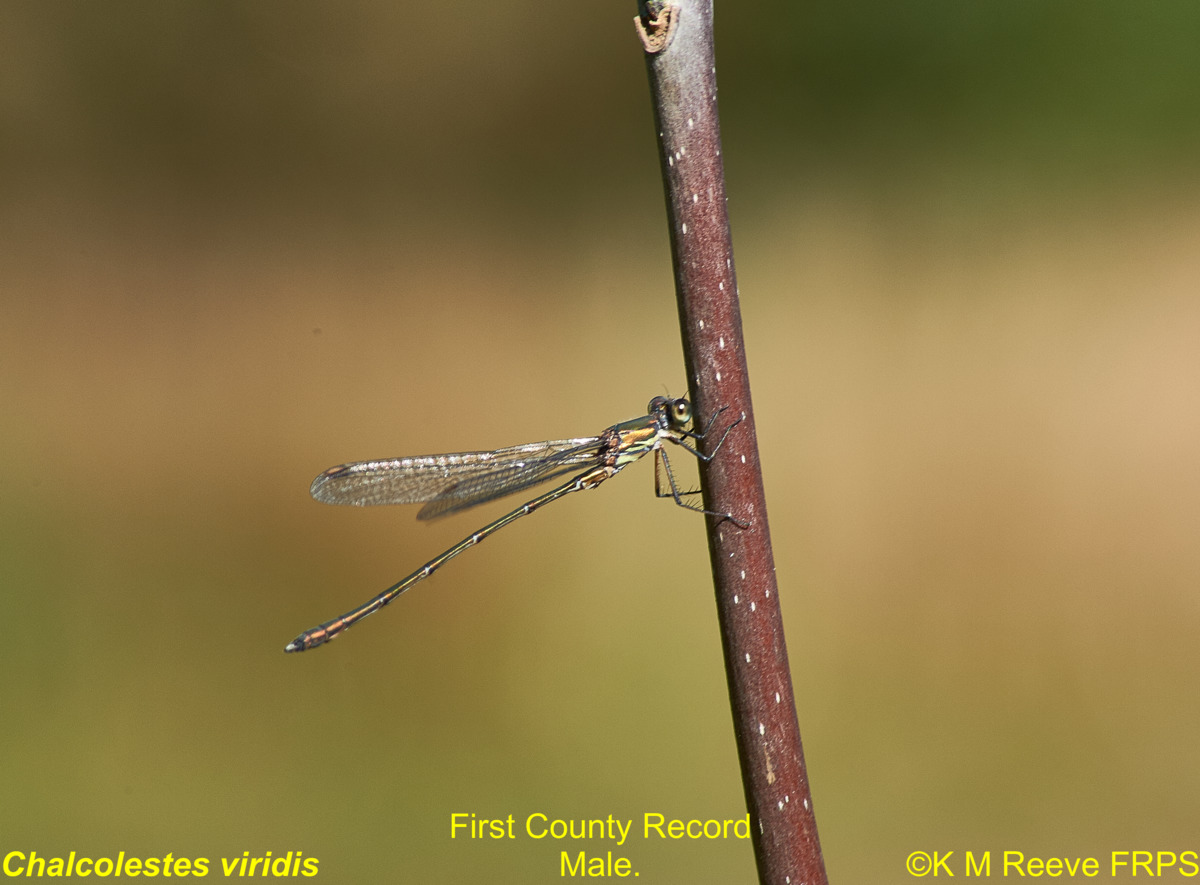 Willow Emerald 2019.
Willow Emerald 2019.
|
|
Back to page top
July 17th 2019 - Reports on the Parsonage Moor and Packington Park Field Meetings.
June 30th 2019 - Parsonage Moor and Dry Sandford Pit Field Meeting.
|
Click on image for next.
Image 1 of 2
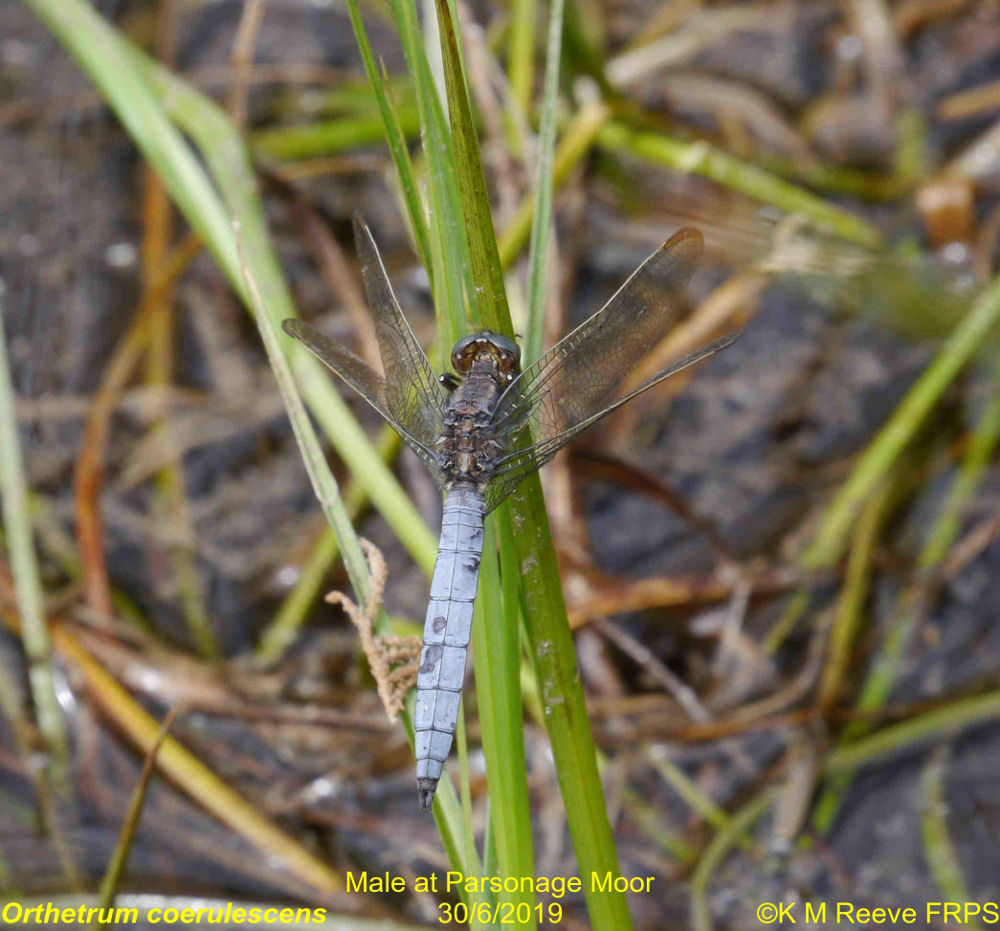
|
On the hottest day of this year to date (32 °C) six of us set off from Dry Sandford Pit car park on the 600 yard walk to Parsonage Moor.
We were not there long! After about an hour and a half all were back at the car park for shade and food.
After lunch some set off to explore Dry Sandford Pit - a very nice nature reserve.
The hot weather brought out the dragonflies and, except for Variable Damselfly, all the unusual species were seen. We just missed the Variable Damselfly which was seen the same day next door on Cothill Fen by a local recorder.
The complete list of odonates found is:
- Small Red Damselfly Ceriagrion tenellum
- Southern Damselfly Coenagrion mercuriale
- Azure Damselfly Coenagrion puella
- Common Blue Damselfly Enallagma cyathigerum
- Blue-tailed Damselfly Ischnura elegans
- Emperor Dragonfly Anax imperator
- Black-tailed Skimmer Orthetrum cancellatum
- Keeled Skimmer Orthetrum coerulescens
- Ruddy Darter (exuvia) Sympetrum sanguineum
- Common Darter (exuvia) Sympetrum striolatum
The exuvia were identified by Jill Brook.
|
In spite of the heat it was a very good day in the field searching for dragonflies.
Back to page top
June 8th 2019 - Packington Park Field meeting.
While we didn't have snow it was chilly and blew and rained at Packington. We arrived at 10.30am not expecting to see anyone but one hardy, or was it foolhardy, soul was in the car park.
We walked along the bund at Park Meadow, saw nothing and went home.
Well almost nothing, Kay and Peter made a quick visit to Great Pool and recovered four very mangled damselfly exuvia – either Blue-tailed or Common Blue Damselflies, or a mixture,
but beyond Peter's skill and patience to separate!
Back to page top
July 14th 2019 - Keeled Skimmer at Bubbenhall Meadow and Red-veined Darters at Earlswood Lakes and all early and mid-summer species flying.
Keeled Skimmer at Bubbenhall Meadow 13 July.
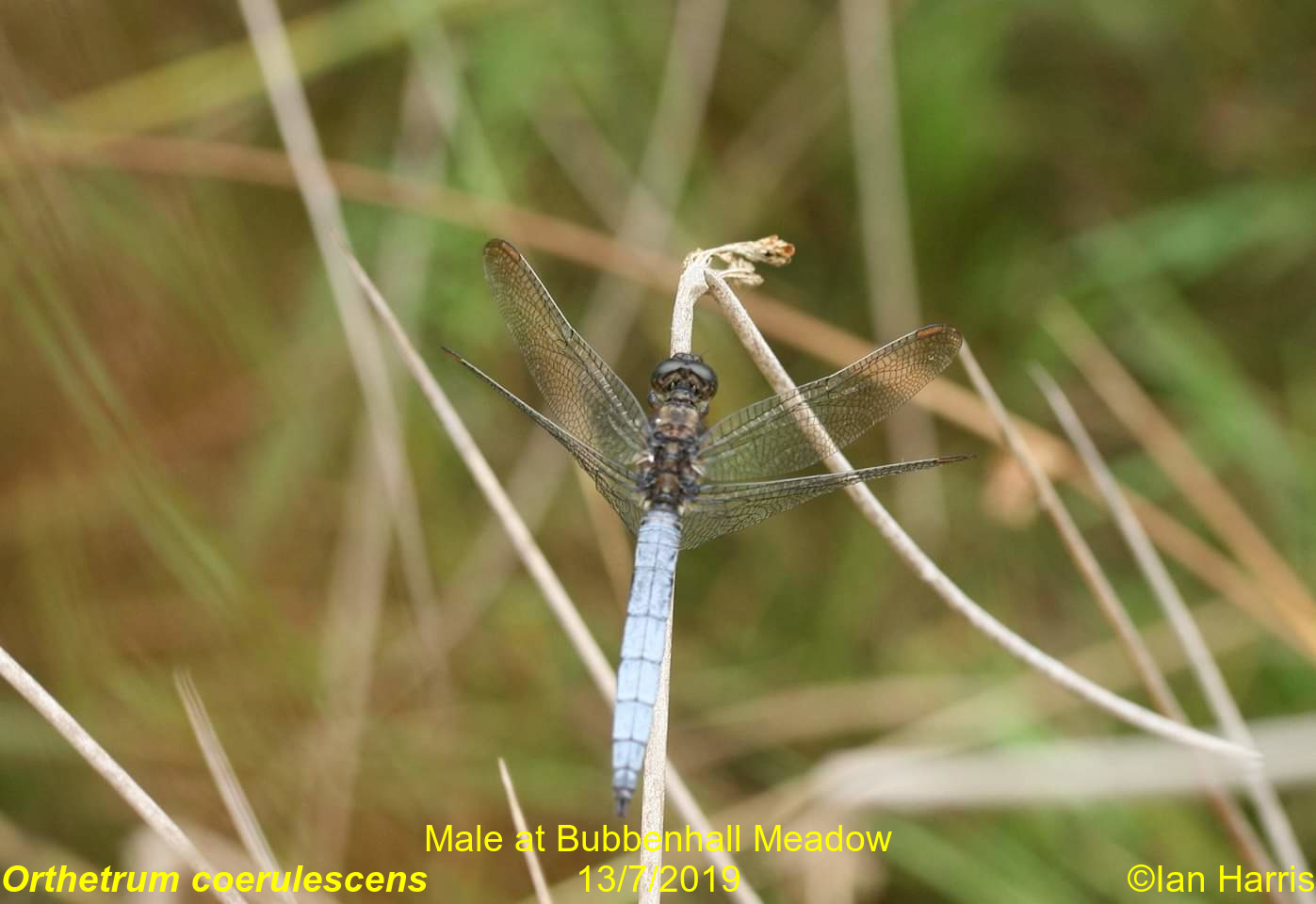
|
Well, more excitement. A little email from Ian Harris on 13th July with an attached image:
I was at Bubbenhall earlier and found this, it just doesn't look right for Black-tailed Skimmer
Can you help
Quite right! It is not a Black-tailed but a Keeled Skimmer. This is the second vagrant of 2019, probably from somewhere more
local than the Red-veined Darter. Think sites like Clee Hill,Shropshire or Parsonage Moor, Oxfordshire as a likely source.
This is only the second confirmed sighting of the species in Warwickshire which makes it special. The first county record was made by Keith Warmington in 2009 at Baddesley, Nuneaton.
Are there more vagrants yet to appear this summer? Yet more reason to get in the field and look for them!
|
Back to page top
Red-veined Darters at Earlswood Lakes 4 July.
|
Click on image for next.
Image 1 of 4
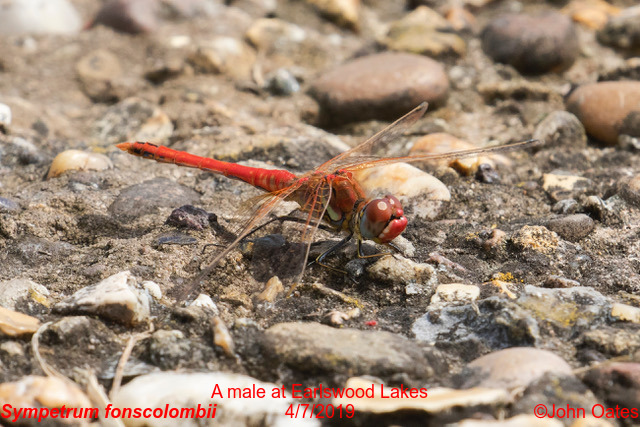
|
John Oates sent this mail on 4th July:
Thought I’d let you know that I saw at least 3 Red-veined Darters at Earlswood Lakes this afternoon. I saw 2 males, followed by a mating pair! They were along the Engine Pool dam. I’ve attached a few pics.
The Red-veined Darter is our first vagrant of 2019 and a good one too. There are three of John Oates' pictures including one of a pair
mating.
The next day Mick Schilling visited Earlswood Lakes and saw three males. His picture of one individual is shown in image #4.
This immigration is part of a country wide influx of the species that occurred at the time.
|
Back to page top
All early and mid-summer species now flying.
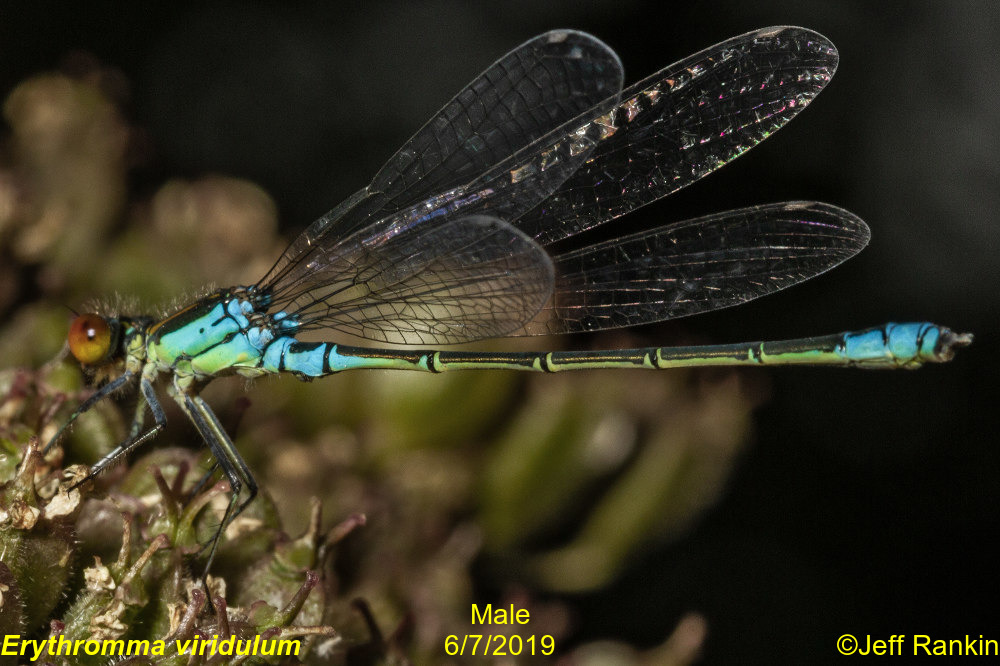
|
The first flights table tells the story.
The last entry in the table is Small Red-eyed Damselfly seen by Jeff Rankin around the Dragonfly Pool at Marsh Lane NR.
What is where can be found from the distribution maps for the species. These are links for the species accounts and the distribution maps
Dragonflies and
Damselflies.
The only one of our breeding species still to be reported flying is the Migrant Hawker. It might well be flying now and if not it will be very soon. A report for the species is needed.
|
Back to page top
Some interesting observations by Darran Rickards.
|
Darran Rickards emailed on 17th June to report:
4 Female and 2 male Calopteryx Virgo on the small brook [Noleham Brook] running through
the back of Giddings Wood between Dorsington and Long Marston when the sun finally came out on Sunday.....
I also had an intriguing glimpse of a small yellow “Dragonfly” on the Avon in Welford in early June that I thought might be Club-tailed.
It disappeared round some rushes and couldn’t be relocated. The date seemed right and I couldn’t think of what else it might be.
The location of the brook is in the Heart of England
Forest and this is the first record of Beautiful Demoiselle
for the stream. This species is extending its range and is always worth reporting.
|
Back to page top
Synchronised emergence of Four-spotted Chasers revisited.
A beautiful hypothesis destroyed by evidence.
|
Click on image for next.
Image 1 of 3
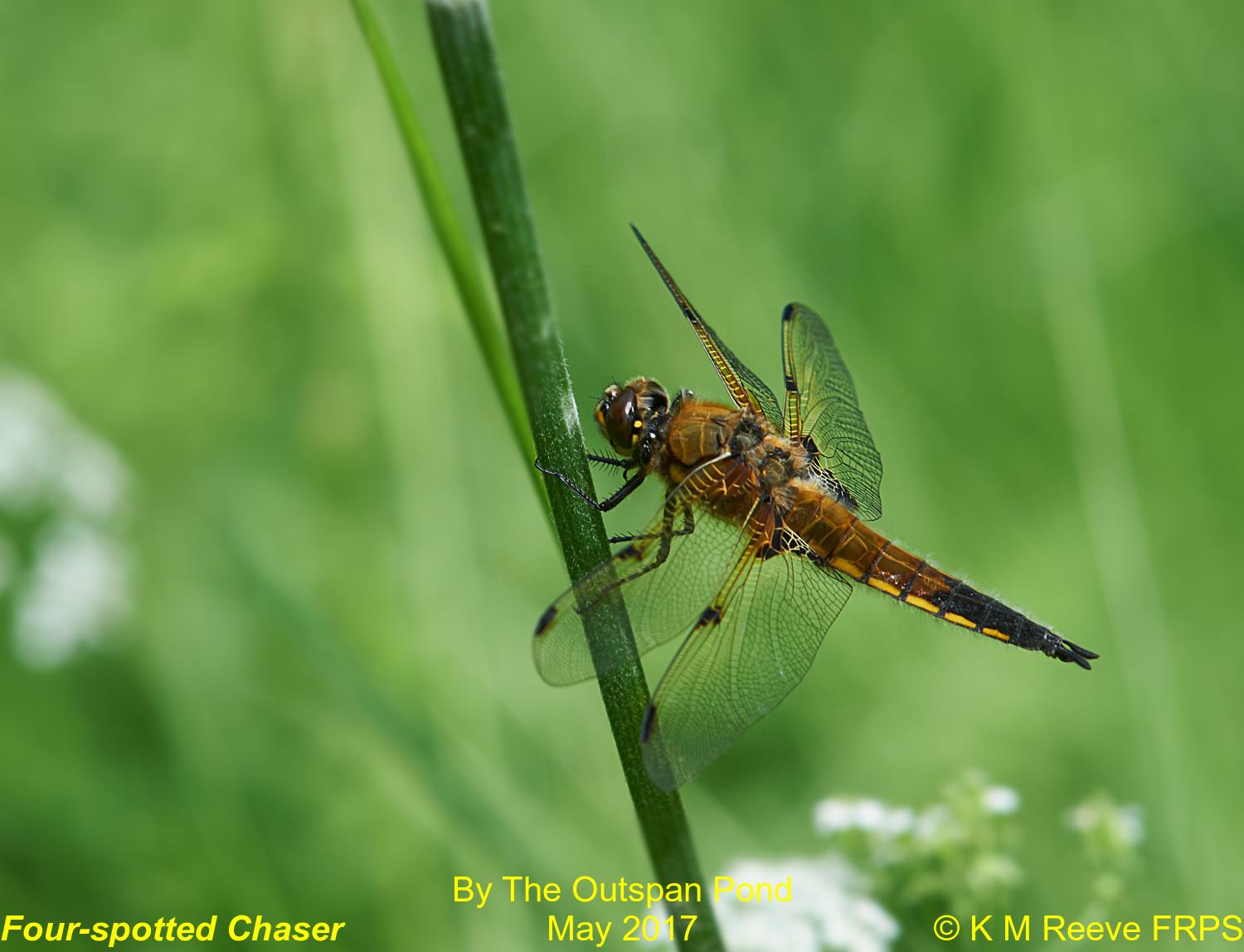
|
Shortly after the emergence commented on in
Synchronised emergence of Four-spotted Chasers.
a single Four-spot emerged on 1st June .
This was then followed by a lengthening list of more emergences of Four-spots.
In addition, a record for a Four-spotted Chaser in May 2017 has come to light. It was photographed and the image shown on the left.
Date
|
Immature adults
|
Exuvia
|
|
20th May 2017.
|
One mature adult.
|
|
|
26th May 2019
|
6
|
6 |
| 1st June.
|
1
|
1
|
|
5th June.
|
|
2
|
|
9th June.
|
4
|
4
|
|
16th June.
|
1
|
1
|
The data must be followed even though it destroys an elegant hypothesis.
But our garden pond has compensated by producing many Southern Hawkers starting on 1st July and continuing.
Are there more to come?
We have collected 37 exuvia so far though though we have seen only a few newly emerged adults. When we look at 9am there are new exuvia but no emergents seen. We need to get up earlier.
Images 2 and 3 show an emergent individual.
|
Back to page top
May 29th 2019 - Thirteen species are now flying.
The count of Warwickshire flying dragonflies is now on the increase with thirteen species to date. More records will come in soon now that more people are out and about.
Hairy Dragonflies at Alvecote Wood.
|
Click on image for next.
Image 1 of 2
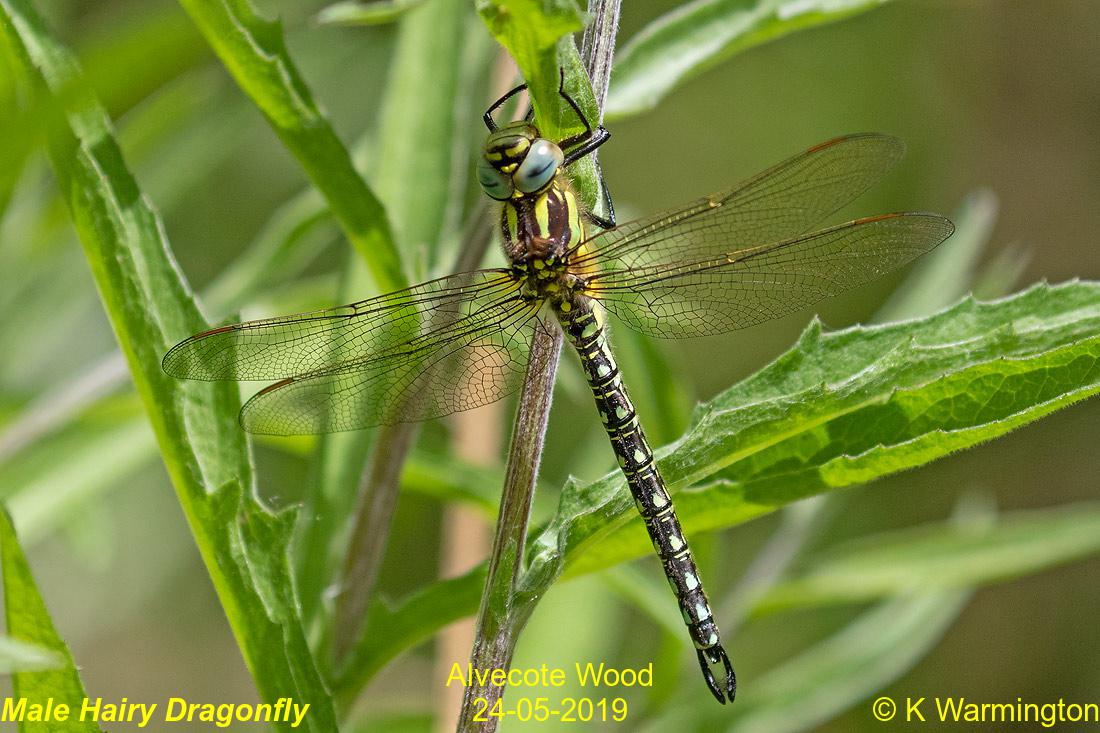
|
Keith Warmington photographed this male Hairy Dragonfly at Alvecote Wood on the 24th May. This was the first
in the north of the county this year, although Jon Bowley's sightings were earlier. Jon saw 5 individuals at Wormleighton Reservoir on 22nd May. There must be more about
at other sites - none have been reported at Napton Reservoir or Brandon Marsh although these are known sites for the species.
There are other potential sites for the species in the county. Look for them at pools with well developed marginal reed beds, e.g. at Marsh Lane NR.
|
Back to page top
Ten further species flying since 20th May.
|
See the Earliest Date table for the species. Two worthy of special mention are
White-legged Damselfly and Emperor Dragonfly. Both were
seen by Mick Schilling on the Avon, the first at Welford-on-Avon and the second at Marlcliff. The White-legged is our earliest ever record for the species and the Emperor -
well, they are just big and dramatic!
Look at the species distribution maps to see if they are in your area or better still get out and see what you find and report it.
|
Back to page top
Synchronised emergence of Four-spotted Chasers.
|
Click on image for next.
Image 1 of 4
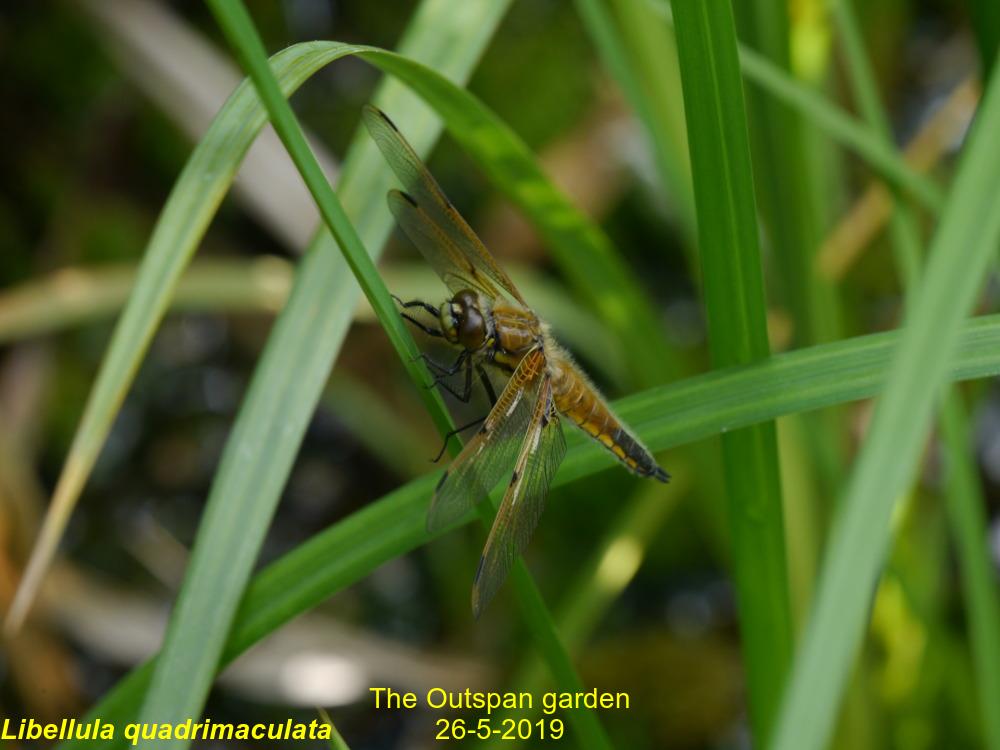
|
A very interesting synchronised emergence of Four-spotted Chasers was observed at our garden pond on
26th May. It was cloudy and breezy and reasonably warm,about 18 degC. The first image shows one of them. Six individuals emerged, probably in the late morning.
They were first noticed when one was blown into the water off the sedge leaf it was emerging on. Its wings were fully formed and it tried to fly ,
unsuccessfully. It was helped out and put on a safe perch from which it flew later. None were seen before or after 26th.
(But see Post Script.)
Further searching located five more individuals, mostly close together in a patch of sedge (on the RHS side of the pond as viewed in the image
at the hut end, see image 2). One individual was on the LHS of the pond nearer the camera. By evening four had flown -
one was seen taking its maiden flight. The remaining two were still there at 9am the following day and flew during the morning -
again, one was seen on its maiden flight.
These are the only records of Four-spotted Chaser at the pond which was constructed in October 2016.
The eggs or larvae could possibly have come in with introduced plants but it likely they were the result of a single batch laid by
female in 2017 or 2018.
Images two and three show the pond now and the site just before its construction in October 2016.
Image four is a picture of an unusual visitor to the garden on the 25th May. An immature male Beautiful Demoiselle. The closest recorded
breeding site is about five miles up the river Leam which itself is about a mile from the bottom of the garden. It may be that there is/are a breeding site(s) closer that are
not yet discovered. Perhaps it is time to look for possible local sites.
P.S. Pure synchroneity destroyed! A single Four-spotted Chaser emerged this morning, 1st June
on the front LHS of the pond as viewed in the image .
|
Back to page top
May 10th 2019 - More early fliers.
There now three species flying: Large Red Damselfly, Broad-bodied Chaser and Banded Demoiselle.
The first two species are dealt with below. Another Banded Demoiselle
was seen by Mick Schilling on the Avon at Welford on 30th April.
First flying Large Red Damselflies of the year in the county.
|
Click on image for next.
Image 1 of 3
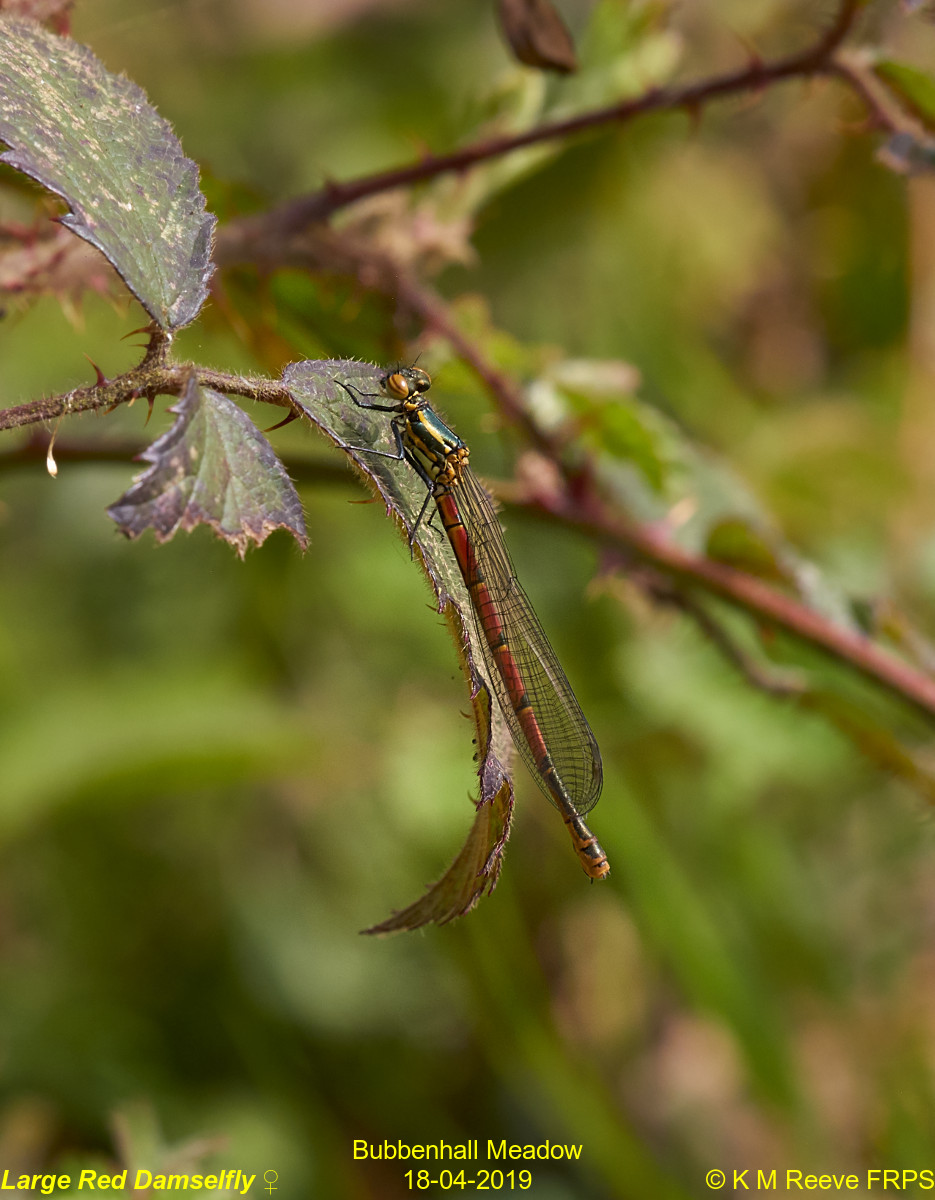
|
During the warm spell in the middle of April Kay and Peter Reeve visited Bubbenhall Meadow on two occasions
On the afternoon 18th April at least eight Large Red Damselflies were seen. Kay photographed
the male and female shown. On the second visit two days later two more were seen. They were all newly emerged.
A smattering of other records for Large Red Damselfly have come in. On the April 21st Sabina George spotted one at Leek Wooton and Richard Harbird
one at Morton Bagot. Mick Schilling recorded them at Wixford on the Arrow on 30th April and 6th May.
Kay and Peter are also pleased to say that several emerged from our garden in May.
At Bubbenhall Meadow there are a variety water bodies, some large pools and some smaller ponds.
The ponds are particular good for still water species. This in no small measure is due to their management by the WWT team, led by Geoff Litterick.
They have been doing a splendid job.
A photograph of Middle Pond shows what a good dragonfly pond is. It is kept open to the south, on the left of the
picture. All scrub is cleared annually in that direction allowing the sunlight to reach the water. To the north
and east there is good protection from winds - it is a sun trap. Hence the early records. There are two other similar ponds close by.
|
Back to page top
Broad Bodied Chaser at Newton Cutting, 1st May,
|
The first county record of a dragonfly is for a Broad-bodied Chaser. It was seen at Newton Nature Reserve by
Steven Wright on 1st May. It is a fairly early record, the equal forth earliest since 2000.
The reserve is a Newton and Biggin LNR and considerable work has recently been undertaken by volunteers, with the help of funding from Aviva, to improve it for wildlife.
The Aviva project webpage gives some information about the reserve, follow the link.
|
Back to page top
April 9th 2019 - First adult of 2019. A Banded Demoiselle at Ladywalk N.R. 30th March.
A very early sighting for Warwickshire of Banded Demoiselle
on 30th March at Ladywalk NR by P. Lichfield. For a photo go to the Twitter feed on the
Ladywalk NR website.
The Ladywalk site is surrounded by industrial plant that discharges warm water. It is noted for its early Banded Demoiselle records in Warwickshire
- 5th May 2018 and 4th April 2017.
This is the earliest ever sighting of an adult in Warwickshire.
Back to page top
April
2019 - Report for 2018 published in the BDS Darter journal.
The BDS publishes the "Darter" every year. It is a communication
journal for the county recorders. Below is article supplied to the
journal for Warwickshire, VC 38. It is slightly different from the
published copy - some editing was done.
Back to page top
Banner artwork by Joan Sharrett Last updated Tue Oct 01 19:35:06 2019
| Visits since Oct 2010: 2275 |
|









